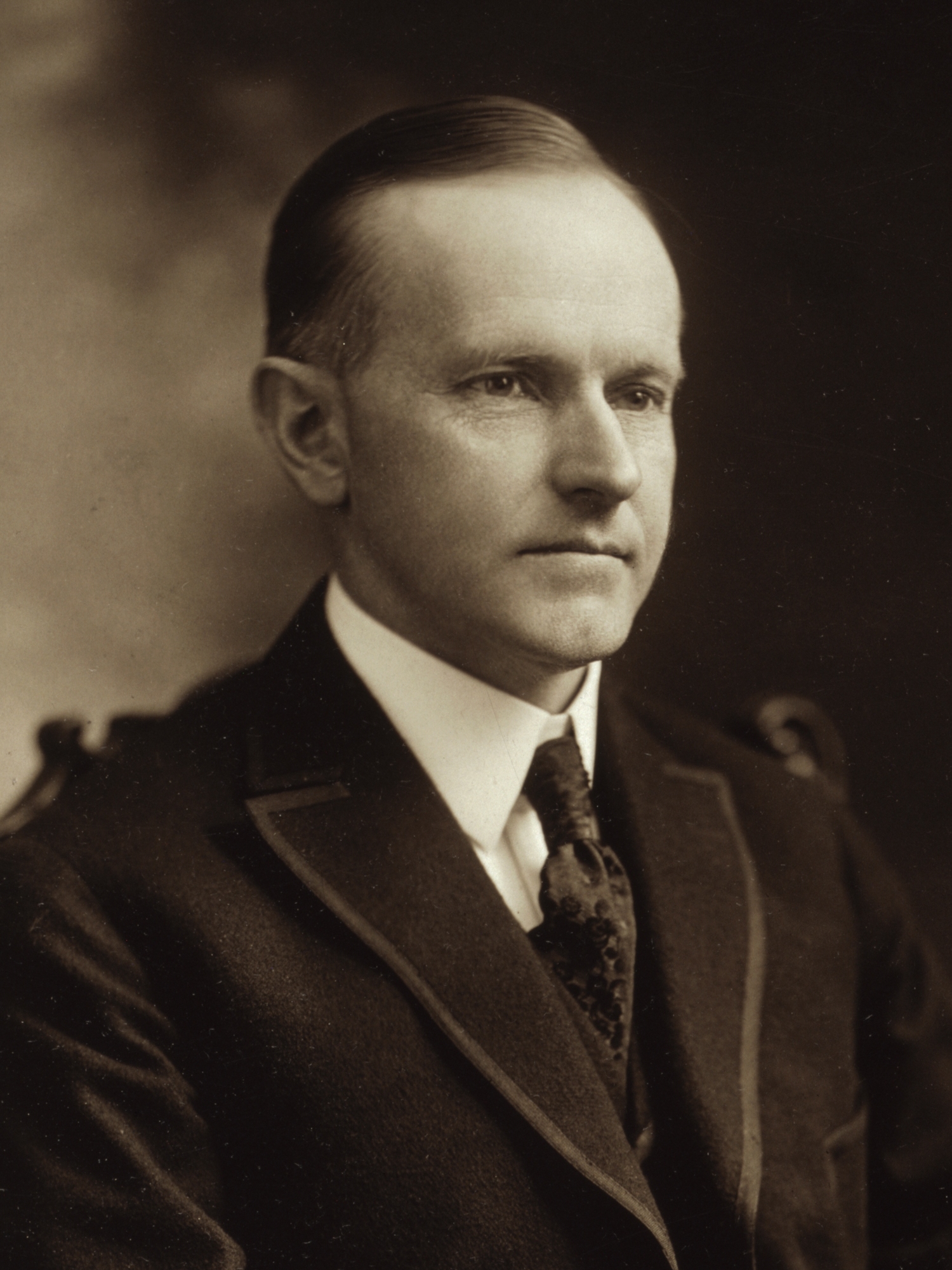John Calvin Coolidge Jr. fue el trigésimo presidente de los Estados Unidos . Era un abogado republicano de Vermont, que comenzó su carrera política en Massachusetts, estado del que fue gobernador. Su reacción a la huelga de la policía de Boston de 1919 le dio fama nacional y reputación de persona decidida. Poco después asumió el cargo de vicepresidente, en 1920; luego asumió la Presidencia del país al fallecer el presidente Warren G. Harding en 1923. Ganó las elecciones de 1924, se granjeó fama de conservador favorable a un Estado reducido y una mínima intervención gubernamental en la economía estadounidense. Se le recuerda como un hombre austero, frugal, discreto y extraordinariamente parco en palabras, pero que tenía un agudo sentido del humor. Es destacable el hecho de que, aunque careciera de carisma y locuacidad, no perdió una sola elección en toda su carrera política.
Coolidge nació en Plymouth, Vermont, en 1872. Era hijo de un político de Vermont; estudió derecho en el Amherst College de Massachusetts y empezó a ejercer como abogado en 1897, para lo cual se estableció en Northampton, Massachusetts. En 1898 fue elegido para un cargo en el municipio y empezó a intervenir activamente en política, uniéndose al Partido Republicano. En 1906 fue elegido para el Senado del estado de Massachusetts, donde amplió considerablemente su carrera política, y en el año 1918 ganó la elección para gobernador del estado.
Ganó fama nacional durante su periodo como gobernador cuando se enfrentó a una gran huelga de policías en Boston en septiembre de 1919, para lo cual llamó a la milicia local con el fin de que asumiera roles de seguridad urbana y evitar saqueo y violencia que ocurrieron en la ciudad durante las primeras 48 horas de la huelga policial. Su negativa a ceder a la presión de los huelguistas y su posterior rechazo a reincorporarlos a la policía tras el fracaso de la huelga, le otorgó popularidad entre los elementos más conservadores del Partido Republicano. Sus colegas de partido pronto le dieron la ocasión de postularse como vicepresidente de Estados Unidos, en las elecciones del año 1920 acompañando al candidato republicano, el senador por Ohio Warren G. Harding. Coolidge asumió el cargo de vicepresidente en marzo de 1921, dedicándose a actividades protocolarias propias de su cargo y forjándose al mismo tiempo la imagen pública de un «hombre de pocas palabras», enemigo de dar largos discursos y aficionado a hablar solo lo necesario e indispensable. En 1924, venció en las elecciones presidenciales a sus rivales, con holgada ventaja.
Coolidge recuperó al confianza pública en el Gobierno tras los escándalos del mandato de Harding, y acabó el suyo con notable satisfacción del electorado.[1][2] Uno de sus biógrafos escribió que: «encarnaba en el espíritu y las aspiraciones de la clase media, podía interpretar sus ansias y expresar sus opiniones. Que lograse representar la genialidad del hombre de la calle fue la prueba suprema de su fortaleza política».[3] Creyente en la libertad de empresa, rechazó utilizar el poder federal para mejorar la condición deprimida de la agricultores y de ciertas industrias. Uno de los principales problemas fueron los proyectos para otorgar subsidios agrarios en un intento de compensar la reducción de los precios de los productos agrícolas; Coolidge se negó a aprobar tales subsidios alegando que manipular precios resultaba un peligro para la economía nacional, y rechazó aún más tajantemente la propuesta de que el Gobierno federal comprara los excedentes agrícolas. Asimismo Coolidge mostró un sincero interés en promover el laissez-faire en la economía estadounidense, rechazando el intervencionismo estatal en todo lo posible, y reiterando que el crecimiento económico del país experimentado en los «felices años veinte» debía ser preservado mediante reducciones de impuestos, para con ello promover la industria y el comercio internacional; por entonces, los Estados Unidos se estaban convirtiendo en la primera potencia mundial. En política exterior, favoreció el aislacionismo y rehusó que los Estados Unidos ingresasen en la Sociedad de Naciones al considerarlo un gesto «inútil».
Tras cumplirse el periodo de su mandato en 1928, declinó presentarse de nuevo a la presidencia, pero tampoco ofreció su apoyo a Herbert Hoover, designado candidato del Partido Republicano para esa elección. Tras su presidencia, Coolidge se retiró a su propiedad rural de Northampton, Vermont, donde falleció el 5 de enero de 1933. Aunque su reputación repuntó durante la presidencia de Ronald Reagan, su valoración posterior es menos favorable. Ensalzado por los partidarios de un Estado reducido y por los liberales, los que prefieren un Gobierno más activo tienen peor visión de él; ambos, grupos, sin embargo, alaban su decidida defensa de la igualdad racial.[4][5]
Wikipedia
✵
4. julio 1872 – 5. enero 1933
